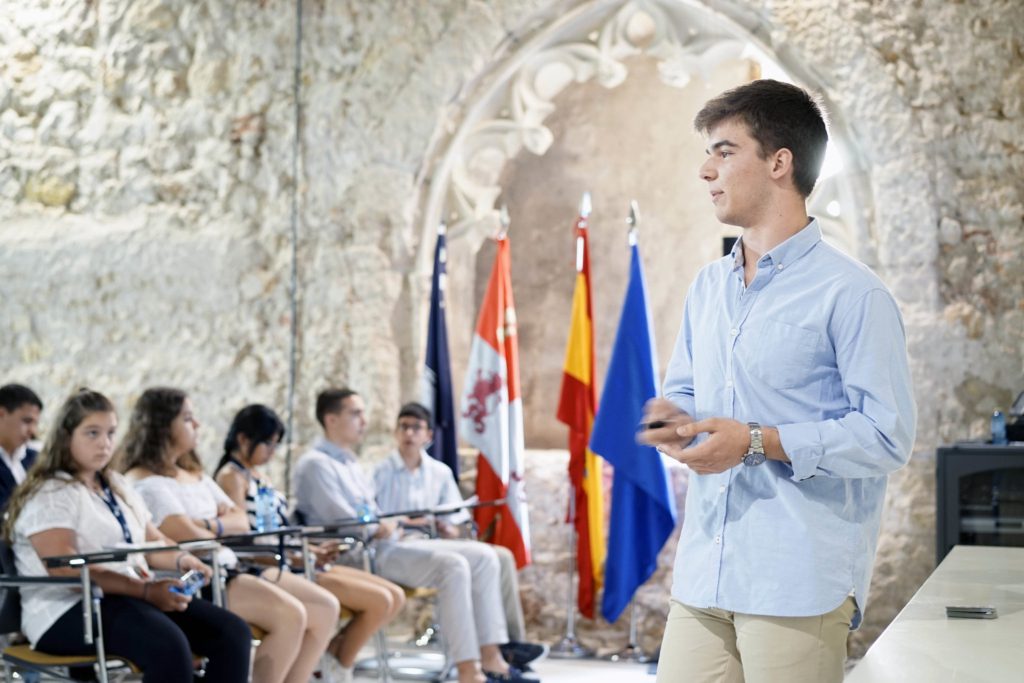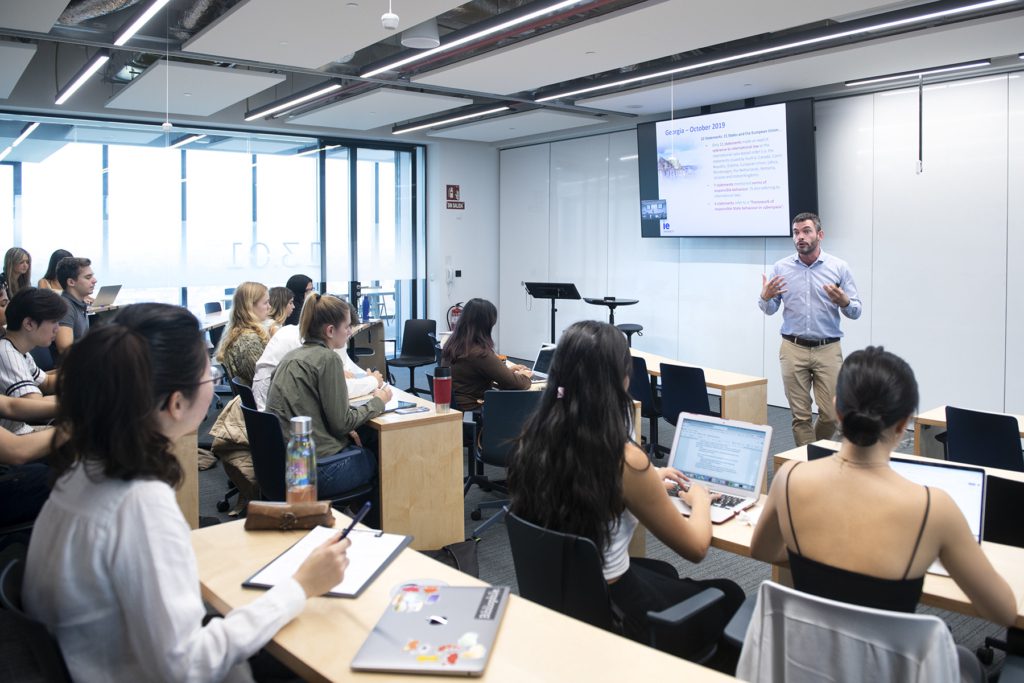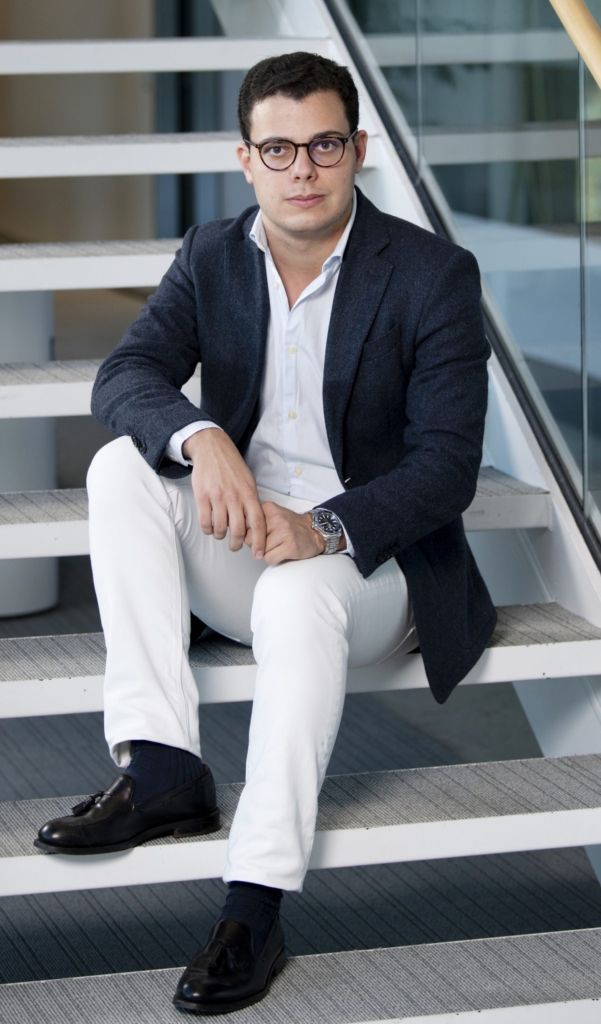
IE Business School students at IE’s Segovia campus, located in a 15th Century monastery in the medieval city of Segovia, Spain. IE photo
Gayle Trisha Were from Nairobi, Kenya, is a senior studying communications and digital media. She wants to work in brand strategy and storytelling after graduation.
In her third year, Sophia Isabella Hurtado of Miami, Florida, is studying behavioral and social sciences with a dream of working in product marketing in either entertainment or tech.
And Tomas Moreno Cebrian Sagarriga, a senior studying strategy and finance, wants to work in sustainable business entrepreneurship, either with his own venture or to help make an existing company more planet and socially friendly. He is a native of Madrid, Spain.

Sophia Isabella Hurtado, IE student
All three are undergrads at Spain’s IE University, a school whose student body hails from 140 different countries around the world. IE is one of the most nationally diverse undergraduate universities in the world, with only about 15% of its student body coming from Spain.
“As someone who grew up partially in Miami and also partially in Palm Beach, I was already used to being surrounded by a diverse group of Latin Americans. However, IE has allowed me to expand my perspective by meeting people from so many places from quite literally around the world. I have friends who have lived in or come from so many different places, which I was not exposed to in Florida,” Hurtado tells Poets&Quants.
“The most surprising thing has been how quickly I settled into living independently and moving to a new country on my own. Madrid has been very good to me in the sense that I am able to walk everywhere. Prices are much better in comparison to back home, among other things. I definitely see a difference in myself from when I first moved here versus now.”
A BBA IN SPAIN, TAUGHT 100% IN ENGLISH
Compared to many other business programs, IE came to its Bachelor of Business Administration (BBA) in the opposite order. IE Business School started its MBA programs nearly 50 years ago, but didn’t launch an undergraduate program until about 13 years ago.
“We kind of integrated vertically backwards, from masters to undergrad. It tends to be the other way around for most institutions,” says Norman Kurtis, Dean of Programs of IE Business School.
It decided to offer its BBA in English to appeal to an international student audience. Today, just about 18% of its undergrad business students are Spanish, and about half of those graduated high school outside of Spain but come back to study at IE. Another 11% of students come from Asia, 27% from Europe, 14% from Latin American, 17% from the Middle East, and 11% from North America.
“There are very few bachelor degrees in the world with this percentage of international students,” Kurtis says. “We are located in Spain, we want to teach Spanish students, but at the end of the day, we are competing for the best students globally who want to study in English.”

IE Business School undergrads inside a classroom at IE Tower, a tech and sustainable campus in Madrid, Spain. IE photo
THE IE STUDENT EXPERIENCE
IE’s BBA attracts about 700 new students each year. It offers eight different concentrations ranging from entrepreneurship, to digital business and analytics, from sustainability management to finance. It also offers five, five-year dual degrees in which students graduate with a BBA as well as a second bachelor degree in either international relations, law, data and business analytics, design, or computer science and artificial intelligence.
Students have the option to study the first two years in Segovia, a UNESCO World Heritage Site, where IE has modernized a 15th-Century monastery into state-of-the-art study rooms, media studios, and high-tech labs.
Or, students can study all four years at the IE Tower, a 538,000-square-foot skyscraper with 35 floors, 64 classrooms, and the latest technology. The tower, which opened in 2021, is the fifth largest building in Madrid.
By design, IE Business School is deeply integrated with global companies. The tower, for example, stands amongst corporate skyscrapers occupied by the likes of PwC, KPMG and other international corporations. Its electives and many courses for its specialized concentrations are taught by practitioners who work in the industries and at the corporations many IE students aspire to work themselves. Students also engage with companies through class projects, challenges, and other applied learning opportunities.
“The relationship we have with the global corporate world gives students the opportunity to connect with corporations very easily. Our name is well known around the world, and this is an important factor in securing a job after graduation,” says Henry Bradford, vice dean of undergraduate programs. “Further, studying with international classmates provides students with an extensive network of connections from all around the world.”
In fact, more than 95% of IE business undergrads find a job within six months. They work in consulting, finance, marketing, entrepreneurship, and at international organizations and NGOs. “Our BBAs have a broad knowledge base and they have opportunities in every sector,” Bradford says.
ENTREPRENEURSHIP AND SUSTAINABILITY
A native of Madrid, Sagarriga initially wanted to study industrial engineering in the UK, but Brexit implications created too many roadblocks. When he decided to pursue a BBA, he chose IE Business School based on its international reputation and its emphasis on entrepreneurship, innovation, and sustainability. IE Business School ranked No. 8 in entrepreneurship in P&Q’s most recent ranking of MBA programs for entrepreneurship, and The Financial Times ranked it No. 1 in the world in ESG and Net Zero Teaching and second in the world for its carbon footprint.

Tomas Moreno Cebrian Sagarriga, BBA ’24
“I think one of our most important differentiators from other institutions is the entrepreneurial mindset,” Bradford says. “This gives the student the possibility to go wherever they want after graduation. Not just creating new companies, but also to be change drivers within institutions and companies.”
Sagarriga now aspires to launch and run a sustainable and socially responsible business that serves as a model for the next generation of entrepreneurs.
“Growing in an international environment has clear value in preparing individuals for the rapidly changing world we live in. In a classroom with people from different cultures, you can learn about the same topics but see them from different perspectives,” he says. “Reinforcing global competence is vital for individuals to thrive in a rapidly changing world and for societies to progress without leaving anyone behind.”
IE is also home to the Center for Health & Well-Being, one of the few such centers at a major university. Kurtis co-founded the center five years ago with a mission to teach students life skills that will follow them throughout their careers. All IE undergrads, including business students, must choose seminars on topics ranging from nutrition, kindness and empathy, mindfulness, resilience, and more.
“We are seeing so much corporate burnout, we’re seeing so much mental illness, we’re trying to be preventative. We’re teaching them skills that will help them in the four years with us, but more importantly, will help them throughout their lives,” Kurtis says. “We’re very proud of that, and there are not many schools that have that.”

Gayle Trisha Were, IE student
Were, the student from Kenya, immersed herself in both the Madrid community and the more than 150 student clubs and organizations available to her. She is a former president and current member of the IE Africa Club and served as Head Curator for the 2023 TEDxIE Conference. She is now a full-time intern for the Center of Health & Well Being.
“From my experience, being a part of student life has been a great way to connect with others, gain work experience, and keep active,” she tells P&Q. “Madrid is my favorite city. The weather is great most of the time, life here moves at a great pace, and the city is vibrant and full of life. There are a lot of things to do depending on your budget which is perfect for students.”
FOR US STUDENTS, THE IE VALUE PROPOSITION
When IE first started its undergraduate program 13 years ago, about 2 to 3% of its students came from North America. Now, it’s between 12 and 15% and growing. The largest portion of those come from the United States. They range from students looking to develop a global mindset and pursue global careers to those who simply want a more diverse student experience.
In the U.S., international students are a distinct minority at top undergraduate business schools. According to our 2023 ranking, the schools with the most international students didn’t even crack a quarter of the class. Seattle University’s Albers School of Business and Economics and Boston University’s Questrom School of Business each had 23.6% international students. The Wharton School at the University of Pennsylvania had 22%.
IE partners with 150 global universities to create student exchange opportunities almost anywhere in the world. This may be appealing to a U.S. student nervous about spending four full years half a continent away from friends and family.
“When I speak to U.S. families, I explain that if you’re a 17-year-old kid from Denver, Oklahoma, Boston or Miami, you can choose to go to a U.S. school for four years, and that is great. Or, you can choose to come to IE for four years and spend one year or a semester studying in the U.S.,” Kurtis says. “We have partnerships with nearly 50 universities in the US. So, you can get the best of both worlds.”
And then there’s the ROI. IE’s tuition is about €25,000 per year, or about $26,400. While that’s a premium price in European standards for an elite school, it’s much more attractive compared to elite U.S. universities. For example, tuition at the topped ranked school in P&Q’s 2023 undergraduate business school ranking, University of Southern California Marshall School of Business, is about $60,446 per year. At The Wharton School at University of Pennsylvania, a four-year degree will cost more than $233,000 not including additional fees. That’s about $58,000 per year.
“IE is extremely competitive from a price perspective compared to the U.S. for comparable institutions,” Kurtis says. “At the end of the day, it’s not a surprise that we’re getting more and more U.S. applicants.”
DON’T MISS: HOW INDIANA KELLEY SUPPORTS ITS STUDENTS — IN SCHOOL & BEYOND and THE AI CLASSROOM DILEMMA: 10 MONTHS IN, HOW DO EDUCATORS FEEL ABOUT CHATGPT?











Questions about this article? Email us or leave a comment below.